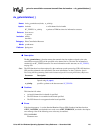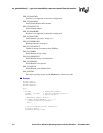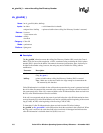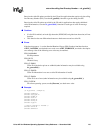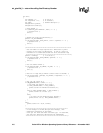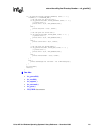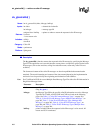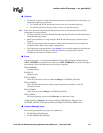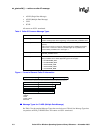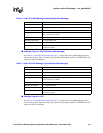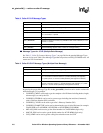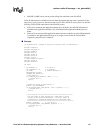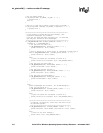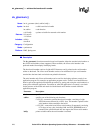
Voice API for Windows Operating Systems Library Reference — November 2003 263
retrieve a caller ID message — dx_gtextcallid( )
!
!!
! Cautions
• To allow the reception of caller ID information from the central office before answering a call
(application channel goes off-hook):
• For CLASS and ACLIP, set the ring event to occur on or after the second ring.
• For CLIP and JCLIP, set the ring event to occur on or after the first ring.
Note: If the call is answered before caller ID information has been received from the CO, caller ID
information will not be available.
• CLASS and ACLIP: Do not use Multiple Data Message Type IDs with caller ID information in
Single Data Message format.
• Make sure the buffer size is large enough to hold the caller ID message(s) returned by this
function.
• JCLIP operation requires that the Japanese country-specific parameter file be installed and
configured (select Japan in the country configuration).
• If the application program performs a dx_sethook( ) on an on-hook channel device during the
short period before the first ring and when the channel is receiving JCLIP caller ID
information, the function will return an error.
!
!!
! Errors
If the function returns -1, use the Standard Runtime Library (SRL) Standard Attribute function
ATDV_LASTERR( ) to obtain the error code or use ATDV_ERRMSGP( ) to obtain a descriptive
error message. One of the following error codes may be returned:
EDX_BADPARM
Invalid parameter
EDX_BUSY
Channel is busy
EDX_CLIDBLK
Caller ID is blocked or private or withheld (infotype = CLIDINFO_CALLID)
EDX_CLIDINFO
Caller ID information not sent, sub-message(s) requested not available or caller ID
information invalid
EDX_CLIDOOA
Caller ID is out of area (infotype = CLIDINFO_CALLID)
EDX_SYSTEM
Error from operating system; use dx_fileerrno( ) to obtain error value
All Message Types (infotype) can produce an EDX_CLIDINFO error. Message Type
CLIDINFO_CALLID can also produce EDX_CLIDOOA and EDX_CLIDBLK errors.
!
!!
! Common Message Types
The following standard Message Types are available for:
• CLASS (Single Data Message)
• CLASS (Multiple Data Message)



